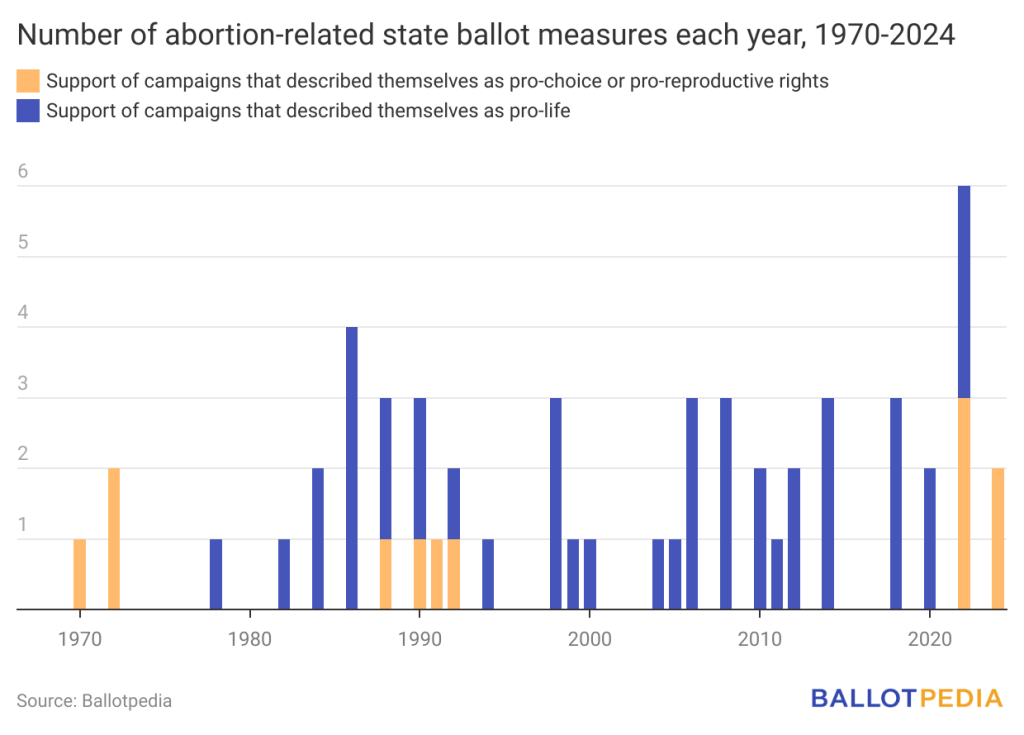Maryland and New York voters will be deciding on two abortion-related ballot measures in Nov. 2024. Measures have been proposed in several other states.

Maryland voters will decide whether to establish a right to reproductive freedom, defined to include "decisions to prevent, continue, or end one's own pregnancy,” in its state constitution. If approved, Maryland will be the fourth state to add language to its state constitution explicitly providing a right to abortion. California, Michigan, and Vermont adopted similar amendments in 2022. The Maryland ballot measure was referred to the ballot by the state legislature.
New Yorkers will decide on a constitutional amendment to prohibit the denial of rights to an individual based on their "pregnancy, pregnancy outcomes, and reproductive healthcare and autonomy," along with other classes like ethnicity, disability, age, and sex. The amendment was also placed on the ballot by the state legislature.
Ballotpedia has identified two potential abortion-related ballot measures that could appear on statewide ballots in 2023 and five potential measures for 2024.
In Ohio, an initiative to amend the state constitution to provide that each individual has the right to make and carry out one’s own reproductive decisions, including but not limited to decisions regarding contraception, fertility treatment, continuing one’s own pregnancy, miscarriage care, and abortion. The initiative would authorize the state to regulate abortion after fetal viability unless it is necessary to protect the life or health of the mother. Sponsors of the initiative have until July 5, 2023, to collect 413,488 signatures to place the initiative on the 2023 ballot.
The Pennsylvania State Legislature must vote a second time during the 2023-2024 legislative session to place a constitutional amendment on the ballot that would add language to the state constitution saying that the constitution does not grant a right to abortion. It first passed the state legislature in July 2022.
Three of the five 2024 ballot measures are citizen initiatives. Florida voters may decide on a right to life of preborn individuals amendment. The initiative sponsors must collect 891,589 signatures by Feb. 1, 2024, to qualify for the ballot. An initiative to prohibit abortion procedures and drugs except in cases to preserve the life of the mother was filed in Nebraska. The required number of signatures is 87,126 signatures, and the signature deadline is July 5, 2024. Lastly, in South Dakota, petitioners filed an initiative to establish a right to abortion and authorize the state to regulate it after the first trimester. The initiative sponsors must collect 35,017 signatures by May 7, 2024, to qualify for the ballot.
The two other measures were proposed by state legislatures. The Hawaii State Senate has passed a right to reproductive freedom amendment with 84% of the Senate voting in favor of the bill. In Hawaii, legislatively referred constitutional amendments need either a two-thirds (66.67%) majority vote in both chambers of the legislature in the same session or two simple majority votes in both chambers held in two successive sessions. The amendment needs to be approved by the House to be placed on the ballot. In Iowa, an amendment to state that there is no right to abortion in the state constitution needs to be passed in a second legislative session after passing both chambers during the 2021-2022 session to make the ballot.
In 2022, there were six ballot measures addressing abortion—the most on record for a single year. Measures were approved in California, Michigan, and Vermont. Measures were defeated in Kansas, Kentucky, and Montana.


